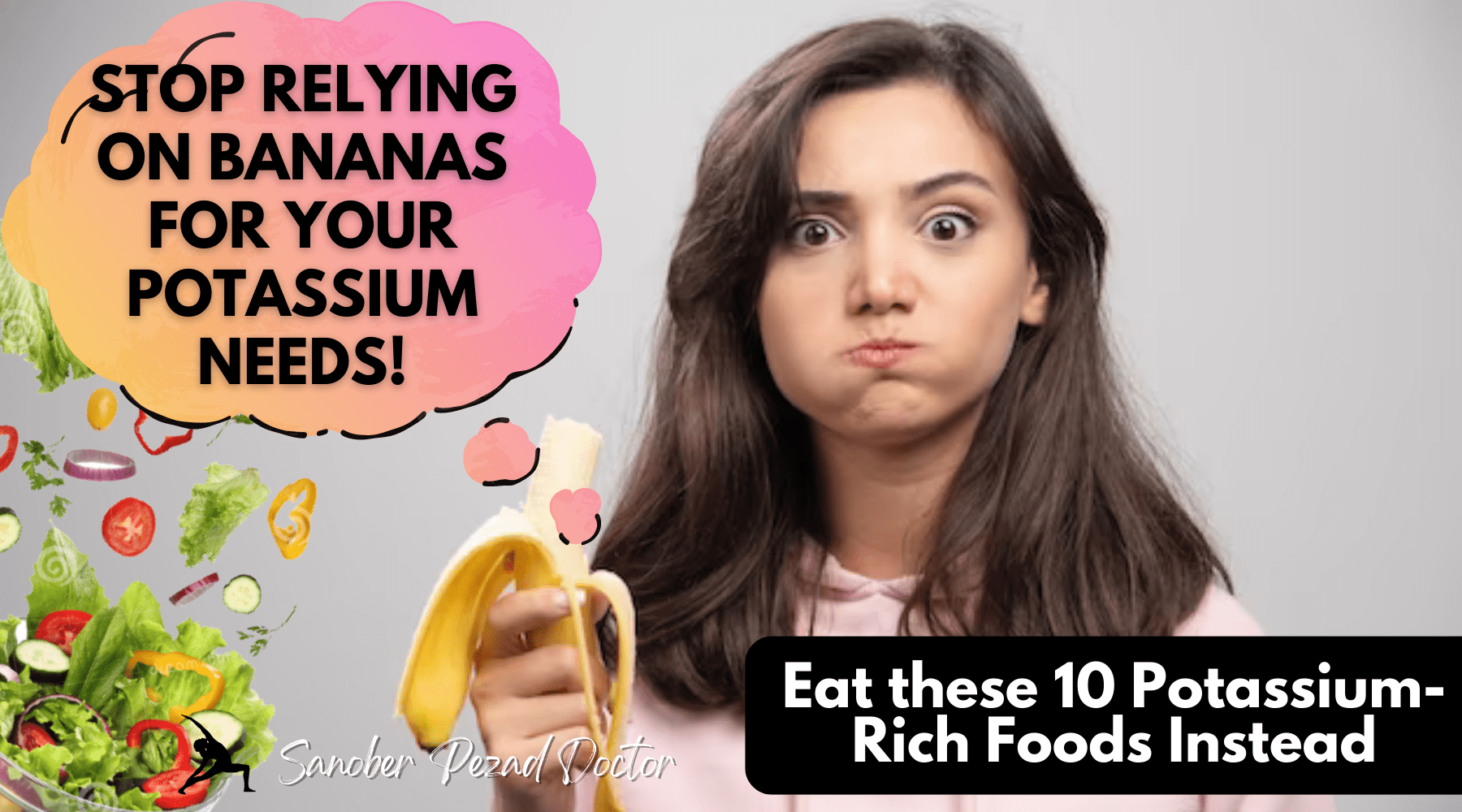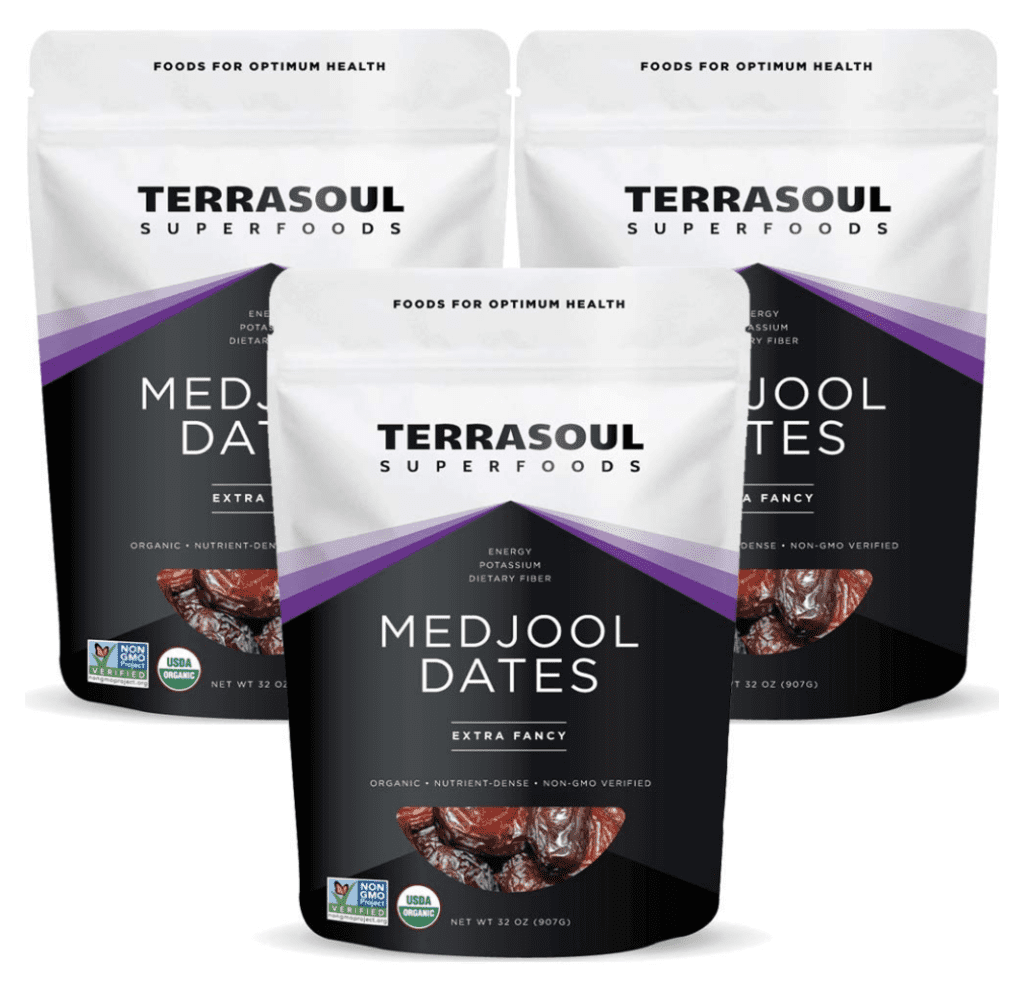Stop Relying on Bananas for Your Potassium Needs!- 10 Potassium-Rich Foods

Potassium generally belongs to one of those nutrients you might not give much thought to (unless you’re eating a banana)! It is often neglected by the other more ‘in-vogue’ multivitamin darlings like vitamin C, vitamin D, and calcium. But potassium serves tons of important functions in the body—many of which you might not even realize it is performing.
In fact, potassium is so critical for overall good health that when the nutrition facts label was given a makeover in 2020, the Food and Drug Administration required that food manufacturers list its amounts in their foods—replacing other nutrients like vitamins A and C. The reason stated was: most Americans aren’t consuming enough! According to the USDA, the average American over the age of two consumes only 56% of the recommended 4,700 milligrams per day.
Fortunately, you don’t have to run chronically low on potassium. It is possible to get plenty of potassium through your diet (even without having to take a multivitamin supplement!).
Read on to discover why this underdog electrolyte is so vital for health.
What Is Potassium?
Potassium is believed to have been discovered just over 200 years ago in 1807. Its name derives from the words “pot” and “ash”—a reference to the fact that it was first isolated in the ashes of plants. Not surprisingly, plants (such as leafy greens) are some of the most abundant sources of potassium. However, I want you to remember that, unlike other micronutrients that can be synthesized within the body, potassium belongs to one of those that cannot be manufactured by the body and hence must be consumed from food sources.
Fun Facts about Potassium that you may/ may not be aware of
Potassium’s chemical symbol is K, but it is completely different from what we refer to as vitamin K!
Potassium is a mineral, not a vitamin—which means it’s also an electrolyte. Electrolytes carry an electric charge that activates nerves and cells, helping your muscles contract and even keeping your heart beating.
Potassium actually has a major role to play in heart health. Since this mineral helps counterbalance the effects of sodium in the bloodstream, it can help reduce the risk of heart attack and stroke. A diet high in potassium and low in sodium significantly lowered the odds of dying of a heart attack according to a recent study.
Benefits of Potassium in the Body
The benefits of this mighty mineral don’t stop simply with heart health. Getting enough potassium in your daily diet can decrease the risk of kidney stones, improve bone mineral density, and stabilize blood sugar levels.
Some of the benefits conferred by the intake of adequate potassium include-
- Energy production
- Endurance during exercise
- Helps prevent cramping
- Helps prevent arrhythmias
- Helps prevent muscle twitching
- Helps prevent tremors
- Helps prevent constipation
- Helps prevent vascular calcification
- Helps prevent insomnia
- Helps prevent insulin resistance
- Helps prevent high blood pressure
- Protects the kidneys
- Helps prevent edema
- Counters sodium toxicity
- Helps make stomach acid
- Helps prevent gout
How Much Potassium Do I Need?
The recommended daily amount of potassium covers a pretty wide range. You may see the daily target referenced as anywhere from 2,600 to 4,700 milligrams per day. Pregnant and breastfeeding women require amounts on the higher end, and men require more than women. Many health organizations settle on 3,500 milligrams as a middle-of-the-road goal. While I don’t really like fussing over numbers, ensuring adequate consumption of potassium-rich food should be your ideal goal.
Keep in mind that if you’re mildly deficient in potassium, you may not have any symptoms, but going too long without enough can lead to problems like heart palpitations, muscle weakness, fatigue, constipation, tingling, and numbness. This condition of low potassium is known as hypokalemia and should not be taken lightly. The good news is there are tons of foods you probably already enjoy that are bursting with potassium.
10 Potassium-Rich Foods
I am sure you are convinced now that potassium is essential for optimal health.
Here are 10 potassium-rich foods worth stocking up on at home!
1. Medjool Dates
Not only are Medjool dates a natural sweetener high in fiber, vitamin B6, and copper, they’re a handy source of potassium, too. Two of the chewy little beauties contain 334 milligrams of potassium—aka 10% of 3,500 milligrams adequate intake.
2. Bananas
You knew we had to go there, right? For reasons unknown, bananas have become synonymous with potassium and its health benefits. (If you’ve ever had a muscle twitch, we guarantee someone’s told you to go eat a banana.)
While—surprise!—bananas aren’t actually the most abundant food source of this mineral, they do earn their reputation for being something of a potassium powerhouse. One medium Cavendish banana (the yellow variety you’ll most often see at the grocery store) packs 422 milligrams of potassium. That’s 12% of the daily adequate intake!
3. Dried Apricots
These Mediterranean fruits are one of the highest-potassium foods on the planet, with 27% of the 3,500-milligram goal in a half-cup.
4. Salmon
With its heart-healthy omega-3 fats and ample protein, salmon seems to top everyone’s list of superfoods. But I’ve got one more perk to add to its stellar nutrient profile: its potassium content. A 3-ounce serving of Atlantic farmed salmon provides 9% of your daily target while wild salmon provides even more, at 15%.
5. Cooked Spinach
Fun fact: cooking leafy greens like spinach can elevate certain nutrients—including potassium. One cup of cooked greens packs an astounding 1,180 milligrams of the stuff! Toss some sauteed spinach into your morning eggs or make a quick spinach salad as a dinner side. Your body will thank you.
6. Watermelon
As you crunch into a fresh watermelon on a summer’s day, you’re not only refreshing and hydrating yourself. You’re also slurping down a surprising amount of potassium: 640 milligrams in two wedges (about 1/8th of a melon). And who can stop at just two wedges? The more tasty triangles you place on your plate at your next barbecue, the more potassium you’ll take in.
7. Beans
Potassium sometimes comes in small packages. Despite their petite size, beans, and legumes are loaded with potassium.
Though all foods in the legume family contain this all-important mineral, some are better sources than others. Cooked white beans win the potassium prize with 1,000 milligrams per cup. Not to be outdone, lima beans, pintos, black beans, kidney beans, soybeans, and lentils are all good choices as well.
8. Potatoes
Potatoes tend to get a bad rap as a high-carb dangerous food. But spuds do have redeeming qualities. When baked with skin, a medium potato provides 941 milligrams of potassium—27% of the 3,500-milligram adequate intake.
9. Fruit and Vegetable Juice
To reap the full benefits of fruits and veggies, it’s usually best to eat them whole, rather than simply drink their juice. But when it comes to potassium, more of the mineral gets extracted when fresh produce goes for a spin in the juicer.
Carrot juice, for example, can contain nearly 700 milligrams of potassium per cup, while orange juice boasts nearly 500 milligrams. Saying yes to the occasional (sugar-free) juice could bring surprising benefits.
10. Plain Regular Yogurt
Plain yogurt is a chameleon ingredient for all sorts of tasty, healthy dishes. You may be used to going Greek for higher protein, but for more potassium (and extra calcium, to boot), stick with the regular variety. Depending on the brand, one cup of unflavored regular yogurt can contain up to about 600 milligrams of potassium.
Bottom Line
While it may be a top-of-mind mineral, potassium is a crucial part of a healthy diet. Getting enough in your daily meals and snacks ensures that your heart, kidneys, muscles, and nerves stay in tip-top shape. Load up on the foods listed above to keep your potassium levels going strong.
An expert can help tailor your efforts to your unique biology and needs, so you can experience the most effective results possible.
As one of the only few skin and health coaches in the world, we provide online coaching for people around the globe.
Sending lots of healthy and happy wishes your way. ?
P.S.- If you like what I share, consider Subscribing to stay connected & Up to Date with the latest Pearls of Wisdom. I do NOT spam. Promise! ?
Also, please leave a comment and share the article with your loved ones. Sharing is Caring!
Feel free to ask a question or leave a suggestion as well. I am always open to learning. ?







Comments
Oh I loved this post! It’s crazy how little K is actually in bananas! Also, I loved how you integrated with a YouTube video!
? Thank you, Sarah!
Great post! I learned so much! I never realized potassium was a mineral therefore an electrolyte. I can’t wait to try incorporating the dates you mentioned into my diet for the benefits. Thanks for sharing!
I’m glad you found you found the article helpful, Valery. The dates are delicious by the way!
This was so helpful and interesting! I had no idea that Watermelon was such a good source of potassium! Thank you for sharing!
Thank you, Katherine. Isn’t watermelon a hidden gem? We often regard it only to its water content. But it is chock full of potassium. Nature knows whats best!